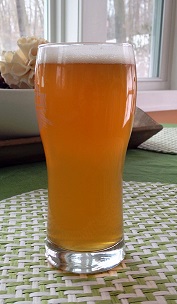
Can you share the origins with us, if not of Whitbread origins?
I can't reliably go further back than 1957 for the Harvey's yeast with what the breweries will tell people - most are protective of their yeast and yeast blends (quite a few aren't have pure single strains). But I think it's safe to say that a yeast strain (and I think it might actually be a blend) that's been in use on a particular set of beers, continuously propagated by top cropping (they do now use Brewlabs as a yeast banking service to maintain quality, but it's not their primary source of yeast) is not the same as the yeast they got from John Smith's. My source for this is the second brewer there, who's the friend of a friend (and responsible for us dodging the two year waiting list for the brewery tour for my stag party, and the early release of a cask of Old Ale for my wedding

).
John Smith's almost certainly top cropped the yeast strain before Harvey's obtained it as well. Their yeast would probably have come from the Samuel Smith's brewery next door some decades earlier, although I'm not sure of that as John Smith's went pretty down the BMC route of commercialization, which Sam Smith's didn't. Neither brewery is in anything like the London environment, and both once used Yorkshire squares (Harvey's fermentors are similar square open fermentors as well). So even if the John Smith's yeast was once from Whitbread (which seems very unlikely, as there were tens to hundreds of big breweries closer to John Smith's than Whitbread before the 1950s - the whole of Burton-on-Trent, for a start), it certainly wasn't the same by the time they gave it to Harvey's.
The Timothy Taylor's yeast (West Yorksire, 1469) is a hybrid of John Smith's and Oldham Brewery yeasts, so that's another strain that's out there. Adnam's (probably Southwold Ale, WY1335) is also actually a dual strain. All these yeasts are notably different in beers with very similar recipes. Another brewery I'm familiar with is Milton Brewery just outside Cambridge. They've been going about 20 years, and their yeast is noticeably different to Adnam's, Harvey's etc., and again, continuously propagated in the brewery. They were our source for yeast when me and the friend mentioned above were brewing in college.
TL;DR version: Nearly all older UK breweries have their own yeast strains or dual or triple strain yeasts, and most practise top-cropping or Burton union style yeast propagation, which means the yeasts quickly adapt to their beers and environment. Even the newer breweries quickly develop their yeast strain as they brew with it.
There's this useful map of
UK Yeast Strains if you really want to get into it. Note that there's more than one Whitbread yeast, there's the A and B strains, at least.




















































![Craft A Brew - Safale BE-256 Yeast - Fermentis - Belgian Ale Dry Yeast - For Belgian & Strong Ales - Ingredients for Home Brewing - Beer Making Supplies - [3 Pack]](https://m.media-amazon.com/images/I/51bcKEwQmWL._SL500_.jpg)






